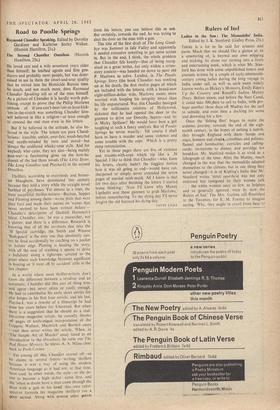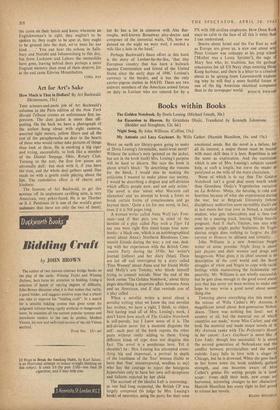Rulers of Ind
THERE is a lot to be said for scissors and paste. Much that we should like a glance at, or a smattering of, is beyond our own snipping and sticking, let alone our turning into a lively and entertaining book, which is what Mr. Stan- ford has done with some unpublished letters and journals written by a couple of early-nineteenth- century young ladies during the long voyage to India under sail, as well as. such more widely known works as Hickey's Memoirs, Emily Eden's Up the Country and Russell's Indian Mutiny Diary. Before steam, and before the Suez Canal, it could take 300,days to sail to India, with per- haps another three days oil Madras for the surf to subside, and even then a ducking for some and drowning for a few.
Once the 'fishing fleet' began to make the arduous journey, towards the end of the eigh- teenth century, in the hopes of netting a nabob, they brought England with them—hoops and stays, bonnets and cloaks, crinolines and pelisses; flannel and bombazine; curricles and calling- cards; invitations to dinner, and porridge for breakfast. Mr. Stanford makes it as vivid as a lithograph of the time. After the Mutiny, much changed in the way that the memsahibs adapted themselves to the climate, but in one thing they never changed—it is of Kipling's India that Mr. Stanford writes 'strict apartheid was not only endorsed but instigated by their women folk . . . the white women once so few, so helpless and so generally ignored, were by now the Rulers of Ind.' The Mrs. Turtons still flourished in the Twenties, for E. M. Forster to imagine saying, 'Why, they ought to crawl from here to the caves on their hands and knees whenever an Englishwoman's in sight, they oughtn't to be spoken to, they ought to be spat at, they ought to be ground into the dust, we've been far too kind. . . .' You can hear the echoes in Salis- bury and Nairobi and Johannesburg to this day, but from Lucknow and Lahore the memsahibs have gone, leaving behind them perhaps a more fragrant memory than most of them deserve, for at the end came Edwina Mountbatten.
CYRIL RAY



































 Previous page
Previous page